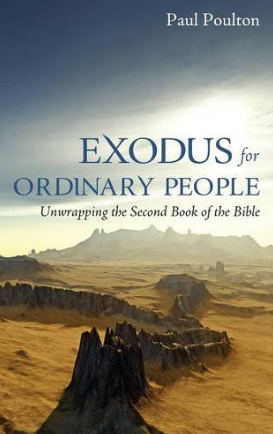Exodus leads the way forward
The book of Exodus is sometimes viewed with scepticism - but it need not be. Paul Poulton's new work aims to shed light on the second book of the Bible, which records a turning point in history where God begins to relate to human beings in a new way
 Christians believe the Bible because God has breathed on it, not because every small point can be proved. Faith must come first, but once faith is in place we begin to find that historical accuracy is also there when we look from the correct angle.
Christians believe the Bible because God has breathed on it, not because every small point can be proved. Faith must come first, but once faith is in place we begin to find that historical accuracy is also there when we look from the correct angle.
Some modern scholars tell us that the book of Exodus was put together sometime between 500 and 600 BC with final revisions taking place in the post-exilic fifth century BC. But if Moses was the book’s writer then it must have been written earlier, as the exodus itself took place in the late 1400s BC and Moses only lived another 40 years after that. According to some teachers the book of Exodus was redacted, and made to look as though it was written concurrently with the events that take place within its pages.
Part of the problem is that modern books written about history require some verification of sources, and books of the Bible that claim to report historical events involving God are not always accepted as historical because some people do not accept God as a cause of events, so the books are not considered factually historical. This happens not only with historical books of the Bible but also with books that claim to be prophetic. Take the book of Daniel for instance: the book prophesies about Media and Persia and Greece becoming dominant political powers, which is what actually happened. If you are happy to accept that God’s Spirit does speak prophetically through people, then you can also accept that Daniel could have written the book. But if you think that prophecy does not occur then the date the book of Daniel was written could be placed later than the events it describes.
The scepticism of some scholars has a way of infiltrating society as a whole. This may be verified by a photo caption I recently saw on a popular newspaper website about the movie Exodus: Gods and Kings. The caption said:
Christian Bale plays fictional religious character Moses in Exodus.
There are two ways of reading that caption: Moses is a fictional entity, or the version of Moses that Christian Bale portrays is fictional. I hope the second interpretation is the correct one, but there are people who will go for the first option.
For the Christian, there doesn’t seem to be a valid reason why distrust should be aimed at the book of Exodus.
The biblical timeline and the record of ancient Egypt fit together well. There is an objection with the vast number of people reportedly involved in the exodus. Critics are quick to point out that the exodus of so many people in such a short space of time would be a logistical nightmare. And they would be correct, but once we look into the matter we find there is reasonable explanation that makes good sense.
On close inspection we are able to figure out which pharaoh is in power, why Moses is sent to tend his flock in the wilderness where grass was sparse, and why Aaron had the facilities and skill necessary to cast a golden calf. The answers are there if we look.
Of course, objections made from an historical-accuracy perspective can have the by-product of taking our eyes off the main themes of the book. One of which is that God begins to reveal himself in a new way to humans. As the NIV puts it:
I am the Lord. I appeared to Abraham, to Isaac and to Jacob as God Almighty, but by my name the LORD I did not make myself fully known to them. (Exod 6:2–3)
Abraham knew the name of Yahweh, but God’s appearance to him was limited. As we move on from Genesis to Exodus God begins to teach Moses, and us, about the nature of the Lord. The essence of his being is not material.
He is Spirit, we cannot see spirit, but everything we can see was made by he who is unseen. So what is unseen is immeasurably more important than what can be seen. Could Moses grasp this? God’s revelation of himself to humans was a gradual process until finally “in these last days he has spoken to us by his Son, whom he appointed heir of all things, and through whom also he made the universe” (Heb 1:2).
Abraham knew God as El-Shaddai, but there was far more revelation to come, and not for him alone, but for us all. The book of Exodus shines a light from its burning bush and I hope I have captured some of the light in Exodus for Ordinary People.
Paul Poulton is a writer, speaker and singer-songwriter. He talks about life, human idiosyncrasies, his Christian faith and philosophy, sometimes seasoning his discourses with humour. Paul is a member of his local Baptist church in Staffordshire.
Exodus for Ordinary People - Unwrapping the second book of the Bible is his second book. It follows Genesis for Ordinary People.
Baptist Times, 21/10/2016